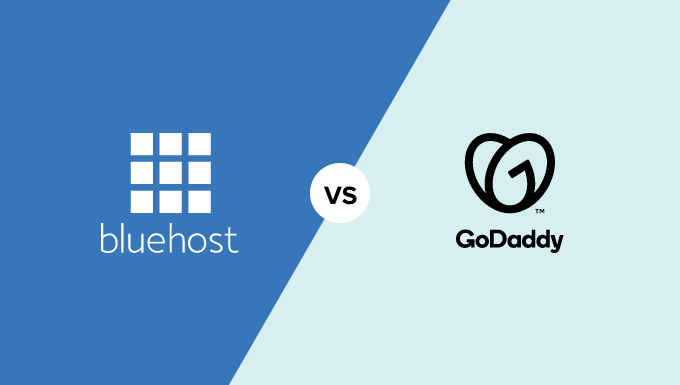Are you in search of an honest web hosting comparison between Bluehost and GoDaddy? These two hosting providers are widely recognized and offer budget-friendly options in the hosting market. However, deciding which one suits your website, especially if you’re a beginner, can be a daunting task. In this comprehensive guide, we’ll delve into a detailed comparison of the pros and cons of Bluehost versus GoDaddy to equip you with the knowledge needed for an informed decision.
**Bluehost vs. GoDaddy: A Comprehensive Comparison**
Bluehost and GoDaddy both cater to users seeking cost-effective hosting solutions. GoDaddy boasts an extensive clientele, hosting over 40 million websites, while Bluehost stands as an officially recommended hosting provider by WordPress.org. So, which platform is the right fit for your new WordPress website? In this comparison, we’ll scrutinize the strengths and weaknesses of Bluehost and GoDaddy, but if you’re seeking a quick summary, here it is:
*Bluehost: Affordable, WordPress-friendly, and beginner-friendly.*
*GoDaddy: Offers WordPress-optimized hosting, managed hosting, and affordability.*
Now, let’s dive into the details of each hosting provider to see how they measure up.
**Bluehost Comparison**
Bluehost ranks among the largest global web hosting companies and is officially endorsed as a WordPress host. They provide hosting plans tailored for WordPress, featuring faster servers and reliable performance. Bluehost’s shared hosting pricing is competitively lower than many competitors, making it an excellent choice for beginners and small businesses on a tight budget.
*Pros of Bluehost:*
1. **Lower Costs:** Bluehost’s entry-level plan enables you to launch your website at a budget-friendly price, making it an attractive option for small businesses, bloggers, portfolios, and various other website types.
2. **Ease of Use:** Bluehost boasts a user-friendly hosting control panel that simplifies WordPress installation (via one-click) and website management.
3. **Free Domain:** They offer a complimentary domain name, helping you save money on initial setup costs.
4. **Free CDN + Free SSL:** Bluehost includes a free Content Delivery Network (CDN) to enhance website speed and a free SSL certificate for improved security.
5. **Website Speed:** Bluehost performs admirably in speed tests, even without performance optimization. You can further boost your website’s speed by using WordPress caching plugins.
6. **Staging Sites + Development Tools:** Bluehost plans incorporate features like staging site setup, automatic WordPress updates, the ability to change PHP versions, SFTP access, and more.
*Cons of Bluehost:*
1. **Higher Domain Renewal Price:** The cost of renewing a domain with Bluehost is higher than the industry average, though this might not significantly impact most businesses immediately.
2. **Upselling Addons:** During the signup process, there are numerous upselling offers for additional products that beginners may not require right away.
*Bluehost Review:*
Bluehost boasts a 5-star rating on WPBeginner, based on over 300 user reviews, highlighting the exceptional value they offer at affordable prices. Our performance and stress tests on their servers also yielded positive results. Bluehost provides a free domain with all plans, unlimited bandwidth, SSD storage, and overall great value. Their eCommerce hosting plan for WooCommerce includes over $1000+ in premium WooCommerce and WordPress extensions, offering substantial cost savings for online store owners.
**GoDaddy Comparison**
GoDaddy is a well-established web hosting company and the world’s largest domain registrar. They provide a wide array of hosting plans suitable for individuals and businesses of all sizes. While GoDaddy enjoys a significant market share in website hosting, it may not always be the ideal choice for website building, blogging, or launching new businesses.
*Pros of GoDaddy:*
1. **WordPress-Optimized Hosting:** GoDaddy’s managed WordPress hosting plans run on servers optimized for WordPress, ensuring faster and more secure hosting.
2. **Managed Hosting:** GoDaddy handles basic administrative tasks such as WordPress installation, automated daily backups, WordPress core updates, and server-level caching.
3. **Free Domain:** They offer a free domain name, reducing startup expenses.
4. **Free CDN + Free SSL:** GoDaddy plans include the Cloudflare CDN for website speed enhancement and a free SSL certificate for heightened security.
5. **Affordability:** GoDaddy provides reasonable prices for their feature-rich hosting services.
6. **24/7 Support:** Their support is available around the clock via live chat or phone.
7. **Monthly Billing Option:** If you prefer monthly payments, GoDaddy offers this option, although committing to at least a year in advance often results in a bigger discount.
*Cons of GoDaddy:*
1. **Addons:** GoDaddy offers numerous services, and during the checkout process, they may aggressively push additional tools and features as addons. While optional, some users might find the upselling offers too persistent.
2. **Controversial Ads:** GoDaddy’s advertising campaigns have faced controversy over the years, although this does not affect the quality of their hosting services. Some users have chosen to move away from GoDaddy in protest against their advertisements.
3. **No Email Support:** GoDaddy has discontinued email support, though they still offer 24/7 support through live chat and phone.
*GoDaddy Review:*
GoDaddy holds a 5-star rating on WPBeginner, based on 16 reviews, which is fewer compared to Bluehost. Detailed hosting information can be found in our GoDaddy review. Similar to Bluehost, GoDaddy offers excellent value with one year of free domain registration, a free SSL certificate, SSD storage, and unlimited bandwidth. Their hosting plans are managed, reducing ongoing maintenance work. However, GoDaddy’s onboarding experience may not be as beginner-friendly as Bluehost, and they no longer provide email support.
**Bluehost vs. GoDaddy – Which Is the Better Choice?**
After meticulously comparing the features of Bluehost and GoDaddy, you might still be wondering which hosting provider is superior. If affordability is your top priority, Bluehost emerges as the preferred choice. They offer better pricing options for small businesses, outstanding support, and a more beginner-friendly experience with their My Sites dashboard. On the other hand, if you prefer the convenience of managed hosting, where routine maintenance tasks like updates and backups are handled for you, GoDaddy provides basic managed hosting plans at an affordable rate. However, it’s worth noting that their managed hosting plans offer fewer features compared to top managed hosting providers. If scalability and comprehensive features are crucial, albeit at a higher price point, we recommend WP Engine for managed WordPress hosting.
**Frequently Asked Questions (FAQs) About Bluehost vs. GoDaddy:**
We have addressed several crucial questions about Bluehost and GoDaddy, based on our extensive experience in assisting users in selecting the best web host for their specific requirements. Here are some of the most frequently asked questions:
**1. Which hosting provider is better for beginners, Bluehost or GoDaddy?**
Bluehost stands out as the most beginner-friendly WordPress hosting company in the market. They automatically install WordPress upon signup and provide an easy-to-use control panel for managing your hosting account. Additionally, they offer comprehensive guides, video tutorials, articles, and 24/7 access to expert support through live chat and phone. While GoDaddy is also a good option for beginners, it may not provide
the same level of beginner-friendly experience as Bluehost.
**2. Which hosting provider offers better support, Bluehost or GoDaddy?**
Both Bluehost and GoDaddy offer 24/7 support through live chat and phone. However, Bluehost is renowned for its exceptional support, as indicated by its high ratings and positive user reviews.
**3. Can I opt for monthly billing with Bluehost and GoDaddy?**
Yes, both Bluehost and GoDaddy offer monthly billing options. However, it’s worth noting that paying for at least a year in advance often results in a discount.
As you make your decision between Bluehost and GoDaddy, remember to assess your specific needs and priorities. What works best for one person may not necessarily be the ideal choice for you.


